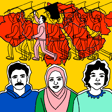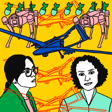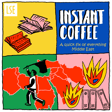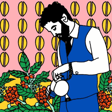Become a Creator today!Start creating today - Share your story with the world!
Start for free
00:00:00
00:00:01

2.7 Migrant Cuisine in the Expat City with Vidya Balachander
Is there such a thing as a Dubai cuisine? What role do the migrants and expats of the Emirate play in curating this food culture? On episode 7 we see if Vidya Balachander can help us find some answers.
The episode also features additional analysis from Steffen Hertog, Associate Professor in the Department of Government at LSE.
Vidya is a food writer, editor and journalist currently based in Dubai. She is the South Asia editor of Whetstone Magazine, an American print magazine and media company dedicated to food origins and culture.
Transcript
Introduction to Season Two: Food and Society
00:00:00
Speaker
The curiosity has always been about how people who are different from me move through the world of food because for me that is a lens for how they move through the world at large. I think to buy such a slick city, you know, it gives you no purchase. Everything is so smoothened out and polished and glittery. Stories don't dwell in places like that. I won't say that I go out looking for the inequality, but it is always a background track.
00:00:30
Speaker
that informs all my thinking, all my reporting and all my writing. This is season two of Instant Coffee, where we talk about everything related to food in the Middle East. I'm Ribal. And I'm Nadine. And Ribal and I are trying to understand how food is shaping the way that people write and organize and think in
Interview with Vidya Balachander
00:00:53
Speaker
the Middle East.
00:00:53
Speaker
On this episode, Nadine and I spoke to Vidya Balachander. Vidya is a food writer, editor and journalist, and she is now based in Dubai. She's also the South Asia editor of Wetstone magazine, which is an American print magazine and a media company dedicated to the origins of food and food culture.
Dubai: A City of Contradictions
00:01:17
Speaker
So Dubai is quite controversial as a place. What do you think, Nadine, when you hear the word Dubai?
00:01:23
Speaker
I'm not gonna give my own opinion, but I think a lot of people have very conflicting views about the place. I know some people think of it as tasteless and oppressive and just a bad reflection of everything that's wrong in contemporary society, but also some people really enjoy it and they enjoy what it has to offer as a holiday destination, the shopping malls, the sun,
00:01:51
Speaker
We did a bit of research and in 2020, 92% of the population in Dubai were non-emirates. So that gave Dubai its grand title of the expat city. Vidya is currently one of those 92% because she moved from India through Sri Lanka, I think last year to Dubai. When you spoke to Vidya, she was debating whether she would call herself an expat or a migrant. There's such a defined difference between what you would call an expat
00:02:21
Speaker
and whom you'd call a migrant. Technically, you're doing the same thing. But I think that there's such a difference in the value attached to those two terms. So I'm not entirely sure what I want to call myself because I think that I'm a migrant for all practical purposes. I will say, though, that I think probably because of my previous experience of having lived elsewhere, I'm not quite as attached to that idea of home. It's not like I want to grasp it quite so tightly.
Unequal Labor Markets
00:02:51
Speaker
The labor markets in Dubai and the rest of the Gulf are some of the most unequal labor markets in the world. There's a really large underclass of low paid foreign workers from the global south and mostly from India, Pakistan, Bangladesh. And then there is a separate labor market for citizens, which is very secure, very comfortable and very well paid.
00:03:16
Speaker
We wanted to find out a bit more about this from someone who knows more about it than we do. So we spoke to Stefan Hertog, who is an assistant professor in the Department of Government at LSE and also part of our Kuwait program. And he spoke to us a bit about the inequalities that exist in Dubai.
00:03:34
Speaker
Foreigners, until recently at least, have had very limited labor rights in terms of the local sponsorship system, which prevents them from switching employers without the agreement of their current employer, an arrangement that has created a lot of abuse historically. But on the other hand, they also have opportunities in the Gulf that they don't have at home, if you look at
00:03:55
Speaker
surveys of return migrants that have worked in the Gulf, they're often relatively happy with their experience, and they certainly can earn a lot more, relatively speaking, than they can in their home markets. So while Western labor markets are really close to them, Dubai, with all the hard work and by our standard slow salary, still open up opportunities for workers in the global South that they don't really have somewhere else. While we're doing our research for this podcast and trying to find people to speak to,
00:04:24
Speaker
Nadine discovered Vidya through an article that she had written for Vittles. It's called Through Chai, Searching for a Truer Version of Dubai. And the piece was fascinating because it just took us past the shiny exterior of the city and past all the tall buildings and into the streets, the cafes, the holes in the walls. And it really explores where the backbone of Dubai, the migrant workers hang out and where they get the wonder hunchai.
Food as a Cultural Lens
00:04:54
Speaker
If I'm going to be utterly honest, I'm not curious about how people like me eat. I know what's available to me. I know what I can access. And as much as I enjoy it and as much as I love the fact that I can go to a supermarket and buy a truffle burrata I needed for dinner, writing about that stuff has never been particularly interesting to me. There are enough people, I think, who do it really well. But for me, the curiosity has always been
00:05:24
Speaker
about how people who are different from me move through the world of food because for me that is a lens for how they move through the world at large. You know, I routinely have conversations with a Raghuveer who has been employed by my husband's company as a driver and he and I have long conversations about what he'd cook. I mean, as much as it's led by my curiosity about how people eat in general,
00:05:47
Speaker
It's also a great metric for what is considered affordable, for what is considered a luxury. So for a person who is employed as a taxi driver or a driver or an electrician or any of those kinds of jobs, maybe eating rice and dal or chapati and dal is what is considered good kind of economic sense. And then your treat would be chicken. People who eat fish, I suppose, is basically that non-vegetarian food is your luxury. It's your treat.
00:06:17
Speaker
The disclaimer to this is the fact that every region in India people eat differently and what's considered a basic meal also varies vastly from region to region. But talking to somebody who lives in Dubai and lives in very different circumstances and is here for a very different reason has always been a great source of curiosity for me because I think as a journalist
00:06:38
Speaker
Those are the stories that lend texture to your storytelling. I think Dubai is such a slick city, you know, it gives you no purchase. Everything is so smoothened out and polished and glittery. Stories don't dwell in places like that. I won't say that I go out looking for the inequality, but it is always a background track that informs all my thinking, all my reporting and all my writing.
00:07:07
Speaker
Due to the harsh international spotlight that labor rights were put under in the Gulf region by NGOs, by international media during the last 10 years or so, there's been substantial improvement in some of the human rights and some of the labor rights of those foreign workers.
00:07:24
Speaker
There have been improvements on accommodation standards, partial relaxation of the sponsorship system, contract substitution has been reduced, the confiscation of passports has been outlawed, at least in principle. On the ground, not all of this has been perfectly implemented, but the situation is definitely considerably better than it was, say, at the beginning of the 2010s. Even if labor rights of foreign workers are better now, they remain spatially and socially very segregated, they bring their own culture, they have their own
00:07:52
Speaker
segregated residential structures and community structures. In many cases, they live in multi-generation households, so they become a quasi-permanent population, even if governments don't necessarily like that. Now governments are trying to attract more white-collar expats and reduce the number of blue-collar, low-wage expats from South Asia in particular.
00:08:13
Speaker
But the very big cost advantage that those workers from India and from Pakistan in particular bring and the convenience that they bring means that those low skilled workers are very likely there to stay and that they'll continue to carve out their own niche in local society.
Culinary Diversity and Disparities
00:08:27
Speaker
For somebody who may not have the degree of privilege that I do, home might be being able to access dal.
00:08:35
Speaker
Let's see. And I'm simplifying this a lot. But when you have this platform of privilege, you have the luxury of making it as diverse and as varied as you want. So what this has demonstrated to me as a journalist is that what we consider essential when it comes to food or when it comes to anything else depends so very much on socioeconomic and cultural background. So I think to that extent, this kind of I'm
00:09:00
Speaker
The fact that I'm spoiled for choice in Dubai and the fact that I recognize this is also a statement on the fact that not everybody may have that choice. From what you've said here, it kind of assumes that these typically Indian and South Asian ingredients were here from the very, or were there from the very beginning. And it's just a case of being able to afford them. But do you think that these ingredients would have actually been there in the first place?
00:09:30
Speaker
if there were only migrant workers, would they be there if it wasn't for the upper-class expats who were living in Dubai? A certain number of ingredients may have been available, but they may have been very different. I imagine it as a basket, and I think that the basket would have been smaller if you were only talking about migrants who had a certain amount of obviously spending power, and it would maybe have been more basic.
00:09:59
Speaker
But this is just me speculating because you must also remember that Dubai has had Indian migrants since the late 60s or even earlier than that. And at that time, when it was just a small trading port, a lot of the food that you got was basically canned food, stuff that lasted for a longer period of time. There may not have been so much availability of fresh ingredients. And this is based on people I've spoken to about what Dubai was like earlier.
00:10:28
Speaker
When you come to the present moment, I think the sheer variety of things that are available is obviously enabled by the fact that there is a market for it and that there are people who are willing to pay top dollar for it. I realize, for instance, like, you know, there's this fixation for very good Indian mangoes, like Indian mangoes are in season. In India, it's a huge thing because it is a yearly ritual. It's something you really look forward to in a food war where seasonality is being erased continuously.
00:10:58
Speaker
It's still one of those seasonal things that you must wait for, for at least a few months a year. But in Dubai, I realized that the people who think of it as an equally big event are obviously those people who can afford to pay top government. So I wanted to ask you, because you mentioned the migration, the food of migrants, and obviously when food travels, it comes into a new city, it meets other cultures.
00:11:25
Speaker
food changes, the recipes transform as well, and they develop over time. Do you think that Dubai will ever have its own particular cuisine? To be honest, I think it already exists. You know, especially these Malabar paratha rolls, kind of flaky, slightly chewy kind of paratha made with white refined flour, which is very popular in Kerala and South India.
00:11:50
Speaker
usually used to mop up like meat curries and stuff. What has happened in Dubai is that a lot of the cafeterias, which are the smaller establishments, where people just go dip in for like a quick cup of karak or a quick snack, they're mostly run by people from Kerala, generations and generations of people from Kerala. And some smart person obviously thought of putting one and one together, a cultural influence from there and here.
00:12:17
Speaker
and created these parotta sandwiches. They're called sandwiches, but they actually like parotta rolls. And they fill it with fusion of ingredients, including chips Oman, which is a wildly popular chips brand, originally from Oman, but very popular throughout the Middle East. And it may also include, let's say shredded chicken with craft cream cheese, an Arabic kind of hot sauce. It's not actually an Arabic hot sauce, but it's just
00:12:44
Speaker
really liked here. The hot sauce is made in Louisiana, but it's really loved here. It has a sharp kind of vinegary taste. Together, this parotta roll is such a hybrid that you're not going to find anywhere else. It's such a peculiarly Dubai thing. Vidya told us that this hybrid Dubai food scene is now deep rooted in both the migrant and local communities, and they have both embraced it as part of their shared culture. I was talking to a friend recently,
00:13:15
Speaker
about local kind of love for the cafeteria snack and the cafeteria chai. And she was telling me, she's lived here for a much longer time than I have. She's lived here for close to 11 years. And she was saying that, you know, it's such a treasured local custom, especially when the weather dips in December, in January. When you can be outside, it would actually be nippy and you would want to drink something hot. It's a treasured custom.
00:13:43
Speaker
to open your phone and order your karak chai and your paratha roll to be delivered to you on the beach while you sit there and eat it. And this I thought was such a great example of all the things that make Dubai work. The app, the instant availability of nourishment. Nourishment may be an exalted word, but refreshment. And this particular combination of something hot and sweet
00:14:12
Speaker
brewed for a long time with lots of evaporated milk, and this really hot paratha roll, which doesn't contribute much by way of nutritional value, but then some of the best foods in the world have zero nutritional value, but it hits the spot. And I thought it was such a great example of this peculiar slice of local culture, discovering it and kind of having an appreciation for it
00:14:40
Speaker
also led me to realize that it isn't just that all these food cultures kind of come here collide and and serve their communities and don't actually assimilate in any way into into the city you know there is an underlying food culture that has also developed because of some smart entrepreneur who thought this might be a good idea and and now
00:15:07
Speaker
at least a few generations of Arabs, Indians, Pakistanis, Bangladeshis have all grown up enjoy this extremely hybrid, but deeply Dubai food scene.
Cultural Appropriation and Identity
00:15:20
Speaker
While I was looking into people who could join us on the podcast, I was asking some friends about what themes they thought would be important to bring up in the podcast. And a lot of my friends, especially those who have
00:15:35
Speaker
who are originally South Asian, spoke about Karak Chai and spoke about what they perceived as a co-optation by Dubai and other Gulf states of the drink as their kind of national drink. And for them, especially considering the deep inequalities that exist between South Asian migrants and Emiratis, it was something that stung them. I wanted to ask you, Vidya, about
00:16:04
Speaker
this idea of karak chai and co-optation. Is this something that's discussed in Dubai at all? Do people of South Asian origin, do first or second generation immigrants, especially younger people, do they feel a kind of disdain towards the way that the drink has been made a national drink, even though this is not really where the drink comes from? Do you have any idea of those kinds of conversations happening? Or is it something that's kind of uniquely
00:16:32
Speaker
diaspora outside of Dubai and the Gulf. There's a degree of nuance there. You know, because I think that people see Karak here as being different from Indian Chai. It gives you the reassurance of drinking something that is familiar, but it's not exactly what you would make back home. It has been embellished. It has been added to, it has changed in the process. For me, it's a source of anthropological curiosity, but I'm not the right person
00:17:02
Speaker
to answer that. I was talking to a researcher and he has lived in the Gulf for much longer than I have. I think he is second generation here. He painted this really beautiful picture for me where he said, you know, for most Muslim migrants from the subcontinent here, Friday, which is the day that you get off, going to the mosque, of course it's spiritual and of course it's something that is deeply rooted in their culture. But also he said it's also an occasion for them to
00:17:30
Speaker
kind of slough off the weak and meet other people. It's a social occasion. That's the reason why a lot of these smaller cafeterias are attached to the larger mosque complexes. And it was only after he pointed it out to me that I began to see it that way.
00:17:46
Speaker
And you see that a lot of allied services are also available near the mosque. Like you'll have a grocery store, you'll have a barber shop, and you'll have a chai shop. And so you can see the trajectory of what people are likely to do on their, maybe their only day off. I think it is that person who does this, for whom this weekly ritual means something. And I think if you ask that person, the answer you'd get would be a much more relevant answer to that question.
00:18:16
Speaker
Obviously, you've done a lot of work about South Asian culture and migrants from the region, but have you done any comparative work about migrants from other places that live in Dubai? I think that the reason why I've done so much work on South Asian migrants is simply because it's easier access for me. But having said, I think that Dubai is hugely interesting because so many different cultures and so many different communities come here with their own set of
00:18:45
Speaker
cultural values when it comes to food, like wildly different food habits. In fact, one of the things that I'm deeply curious about is the fact that every single one of these communities has, you know, these small community grocery stores, that stock ingredients particular to that community. I have a vendor that I go to at the Karama fish market. It's one of the older standalone kind of wet markets. When I look up and I see his shelves, there's such a clear demographic
00:19:13
Speaker
kind of division between all the communities that frequent that store. There is a range of Filipino sauces. There are noodles of various noodles that are used in Chinese cuisine. There are Arabic hot sauces. There definitely is something. There's a lot that needs to be said about this. And I, for instance, would be very curious about
00:19:40
Speaker
the extent to which other communities, other cultures go to recreate that sense of home and what the contours of that home might be. For instance, while reporting another story recently, I learned that theopoeia ninjaera is flown into Dubai every single day from Ethiopia. And I was staggered by that because I think that that shows a really commitment to eating the food that is most beloved to you. I mean, you know, we can debate the
00:20:10
Speaker
carbon footprint of that another day, but I thought that it was, it showed an impressive dedication to eating food that you're attached to or that means something to you. So yeah, I mean, there are great stories to be told. I want to take that on. And I think that it would give me such a window into how other diasporic communities feel towards Dubai and feel towards the homes that they've left behind.
00:20:36
Speaker
Listening to you speak about all this food and everything that's happening in Dubai got me a bit excited about going back there to be honest and maybe discovering other aspects of it that I would never have thought of looking into.
Unseen Depths of Dubai
00:20:50
Speaker
Yeah and this has actually made me want to go to Dubai which is not something that I've ever spent a lot of time thinking about actually. I think that was my endeavour to make my friends want to visit me. A lot of whom
00:21:01
Speaker
have heard all of this stuff about Dubai and a lot of whom are very deeply skeptical about what it represents and what it stands for. Honestly, it's also a way to make it more interesting and to make it more livable and textured for myself. And so I think that I have really tried to look beyond its surface. And for instance, I think one of my happiest days was when I went to this area, there's a huge concentration of labor camps.
00:21:30
Speaker
Normally a woman expert would never go there, but I was so delighted to be taken there. And I saw these laborers enjoying their Fridays, gathered in groups, just sitting in the cafeterias, just buying a kulfi to eat it on the street. And I felt this rush of kind of recognition maybe and a sense of, okay, you know, the city, it has layers and I'm not entirely sure that I would be able to discover all of them.
00:21:59
Speaker
But it's reassuring to know that they exist. Thank you for listening to episode seven of season two of Instant Coffee. We'll be back in two weeks for another episode of Instant Coffee, which we've already recorded and are very excited to be releasing soon. If you want to learn more about Vidya and her work and everything that has to do with food in Dubai,
00:22:20
Speaker
then you can follow the links in the podcast description. And please follow us on Instagram if you haven't already, which is where we put up most of our content. And subscribe to our channel wherever you get your podcasts from.



















